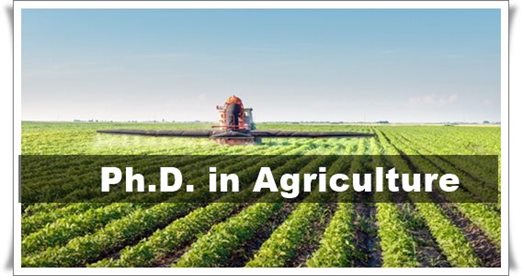Ph.D. in Agricultural Studies: Introduction, Admission, Registration, Eligibility, Duration, Fees, Syllabus 2024

Introduction:
The Ph.D. in Agricultural Studies represents a pinnacle of academic achievement in the field of agriculture. This doctoral program offers aspiring scholars the opportunity to delve deep into the complexities of agricultural science, research, and innovation. In this blog, we will explore the journey of pursuing a Ph.D. in Agricultural Studies, from admission to career opportunities and beyond.
Admission Process:
- Research Programs: Begin by researching Ph.D. programs in Agricultural Studies offered by reputable universities.
- Application Submission: Complete the university's online application form and submit the required documents, including transcripts, letters of recommendation, and a statement of purpose.
- Entrance Exams: Some universities may require GRE or GMAT scores as part of the application process.
- Interviews: Shortlisted candidates may be invited for interviews to assess their suitability for the program.
- Admission Decision: Once all application materials are reviewed, successful candidates receive admission offers.
Eligibility:
- Educational Background: Applicants typically hold a master's degree in a related field such as agricultural sciences, agronomy, horticulture, or agricultural engineering.
- GPA Requirement: Many programs have a minimum GPA requirement for admission.
- Relevant Experience: Demonstrated experience in agricultural research, either through academic projects, internships, or professional work, is often preferred.
- Language Proficiency: International applicants may need to demonstrate proficiency in English through standardized tests like TOEFL or IELTS.
- Research Proposal: Some programs may require applicants to submit a research proposal outlining their intended research area and objectives.
Completion Time:
The completion time for a Ph.D. in Agricultural Studies typically ranges from 3 to 5 years, depending on factors such as program structure, research complexity, and student progress.
Career Opportunities:
- Academic Research: Graduates can pursue careers as researchers and professors in academia, contributing to agricultural science and innovation.
- Industry Leadership: Opportunities exist in agricultural companies, research institutions, and government agencies in roles such as research scientists, agronomists, and agricultural consultants.
- Government Agencies: Graduates may work for government agencies focused on agricultural policy, food security, and environmental conservation.
- International Organizations: Organizations such as the United Nations Food and Agriculture Organization (FAO) or the World Bank offer opportunities for Ph.D. graduates to contribute to global agricultural development projects.
- Entrepreneurship: Some graduates may choose to start their agricultural businesses or consulting firms, leveraging their expertise to address agricultural challenges and meet market demands.
Syllabus:
- Advanced Crop Science
- Soil Management and Conservation
- Agricultural Economics
- Agricultural Policy and Regulation
- Sustainable Agriculture Practices
- Research Methods in Agriculture
Internship Opportunities:
- Research Collaborations: Collaborate with faculty on research projects that involve partnerships with industry stakeholders, gaining practical insights into real-world agricultural challenges.
- Industry Placements: Many programs offer opportunities for internships with leading agricultural companies, providing hands-on experience in various sectors of the industry.
- Government Agencies: Internships with government agencies focused on agricultural policy and regulation offer valuable exposure to the policymaking process.
- International Opportunities: Some programs offer internships abroad, allowing students to explore global perspectives on agricultural practices and challenges.
- Fieldwork and Extension Programs: Participate in fieldwork and extension programs that involve working directly with farmers and communities to implement and evaluate agricultural practices.
Scholarships and Grants:
- University Scholarships: Many universities offer merit-based scholarships to Ph.D. students in Agricultural Studies to support their studies and research.
- Research Grants: Students may have access to research grants from government agencies, private foundations, or industry partners to fund their research projects.
- Assistantships: Teaching or research assistantships provide financial support and valuable professional experience for Ph.D. students.
- Industry Sponsorships: Some agricultural companies sponsor Ph.D. students through scholarships or research grants in exchange for research collaboration or internships.
- Diversity and Inclusion Grants: Universities and organizations may offer grants to support underrepresented groups in agricultural studies research and education.
FAQs:
Is a Ph.D. in Agricultural Studies suitable for someone without a background in agriculture?
While a background in agriculture is beneficial, individuals from related fields such as biology, environmental science, or engineering may also pursue a Ph.D. in Agricultural Studies with additional coursework or research experience in agriculture.
What types of research topics can I explore in a Ph.D. program in Agricultural Studies?
Research topics can vary widely and may include areas such as crop improvement, soil health, sustainable agriculture practices, agricultural economics, and food security.
Are there opportunities for international students in Ph.D. programs in Agricultural Studies?
Yes, many universities welcome international students and may offer support services such as language assistance and cultural integration programs.
Can I pursue a Ph.D. in Agricultural Studies part-time while working?
Some programs offer part-time options to accommodate working professionals, allowing them to balance their studies with their career commitments.
